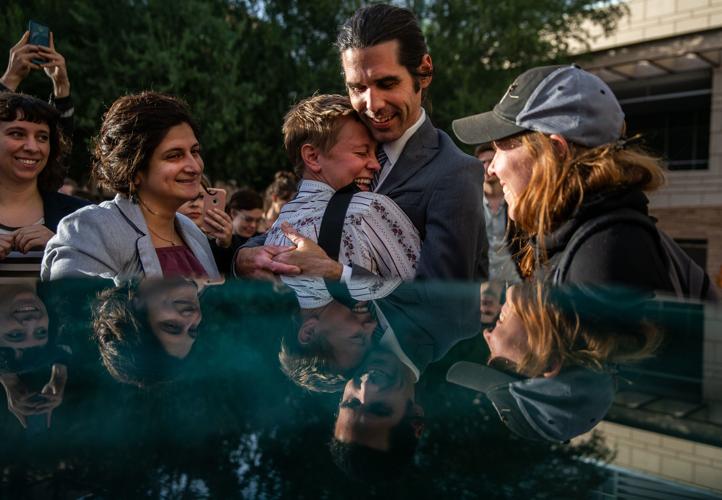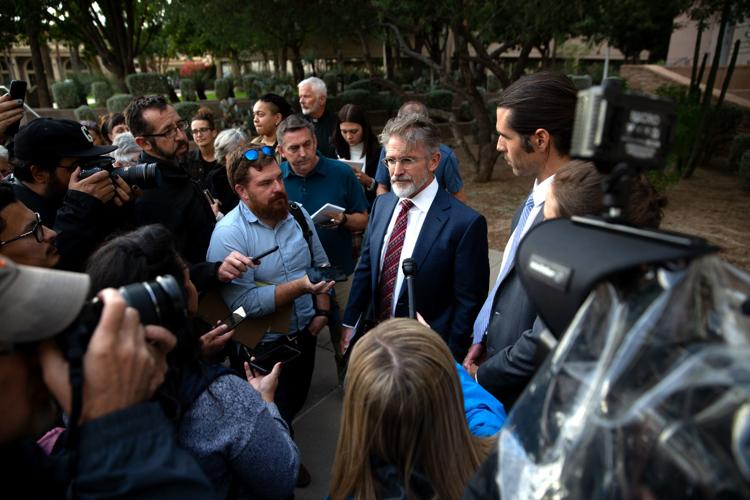Federal court jurors in Tucson found border aid volunteer Scott Warren not guilty of harboring charges after just two and a half hours of deliberation Wednesday.
The case hinged on the difference between helping and harboring.
In closing arguments earlier Wednesday, defense lawyer Gregory Kuykendall said Warren only provided humanitarian aid to two Central American men who crossed the border illegally in January 2018.
"Being a good Samaritan is not against the law. Practicing the Golden Rule is not a felony," Kuykendall told the jury.
But federal prosecutors argued that Warren actually hid the men for four days at an Ajo migrant aid station known as the Barn — then gave them directions to skirt a nearby checkpoint and continue their journey north — solely to help them evade capture by the Border Patrol.
"He gave them a place to stay with four walls that law enforcement couldn't see through. It's the literal definition of harboring," said prosecutor Nathaniel Walters. "They never needed medical attention. What they needed was a place to hide, and that's exactly what the defendant gave them."
Warren's fate was in the hands of a jury for the second time this year.
In June, jurors deadlocked on charges that Warren was part of a conspiracy to smuggle the migrants across the border.
This time around, prosecutors decided to drop the conspiracy charge and retry Warren on the two harboring charges.
The second trial began last week. Warren was the final witness to testify.
He told the jury on Tuesday that he provided basic medical care and food to Honduran Jose Sacaria Goday, 21, and Salvadoran Kristian Perez Villanueva, 23, after they showed up at the Barn on Jan. 14, 2018.
Four days later, when the men told Warren they planned to leave, he said he took them outside and pointed out landmarks they could use to orient themselves and avoid potentially deadly expanses of open desert.
Warren is a volunteer with the Tucson-based humanitarian aid group No More Deaths, which leaves water and food for migrants in the harsh deserts near Ajo and elsewhere along the border.
The group also searches for migrants in distress and helps recover bodies believed to belong to border-crossers.
Since 2001, the Pima County Office of the Medical Examiner has identified more than 3,000 sets of human remains suspected of belonging to migrants who died in the deserts of Southern Arizona.
Warren’s first trial marked the first time in more than a decade that a Southern Arizona border aid worker faced felony human-smuggling charges. The proceedings drew national news attention and a condemnation from United Nations human-rights experts over his arrest.
So far his second trial has received less outside attention, though Warren’s supporters and fellow aid workers packed the courtroom gallery and hung banners at informational booths across the street from the downtown Tucson courthouse. Many of the people in the gallery Wednesday wore collars and stoles usually reserved for ordained members of the clergy.
Closing arguments came after U.S. District Court Judge Raner C. Collins denied a last-minute bid by prosecutors to call border aid nurse Susannah Brown to the witness stand or introduce her previous testimony into the record.
Brown testified during Warren’s first trial, then sat in the courtroom gallery during closing arguments as prosecutors accused her of being part of the smuggling conspiracy jurors ultimately deadlocked on.
Prosecutors said in court Tuesday that they received permission from the Justice Department to offer Brown immunity for her testimony in the current trial, but efforts to serve her with a subpoena were unsuccessful.
Brown was on the defense witness list, but Warren’s attorneys opted not to call her to the stand.
Warren had faced up to a decade in prison if convicted on both felony harboring charges, but such a long sentence would be highly unusual in Tucson’s federal court.
An Arizona Daily Star analysis of about 360 human-smuggling cases in 2018 showed sentences of probation were common for first-time offenders. The longest sentence was less than four years in prison.





